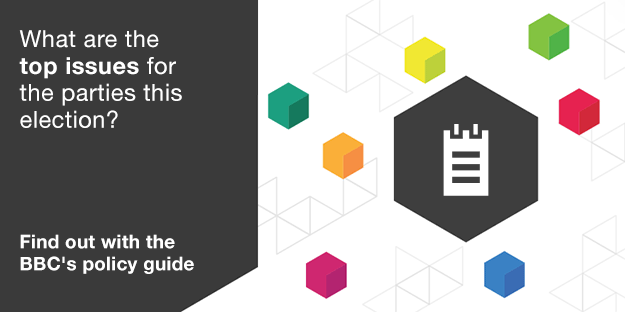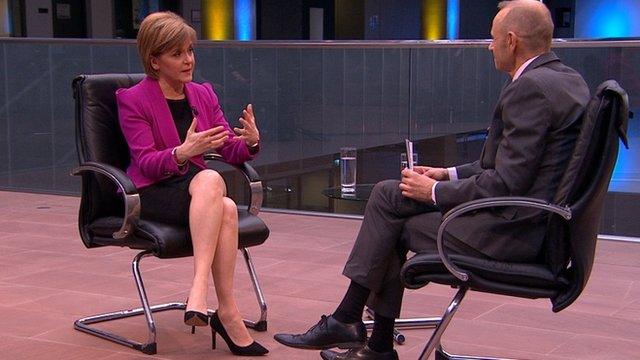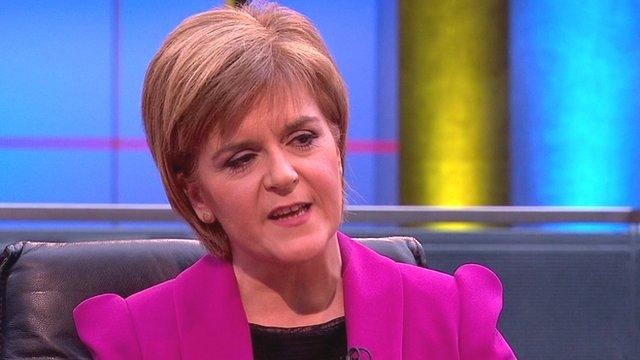Election 2015: SNP's Sturgeon says Miliband has been bullied by Tories
- Published
SNP leader Nicola Sturgeon: ''What Ed Miliband says the morning after the election will probably be different to what he says now"
SNP leader Nicola Sturgeon has said Ed Miliband was bullied by the Tories into ruling out a post-election deal with her party.
Ms Sturgeon made the comment in an interview with the BBC's Evan Davis.
She said an arrangement involving the SNP was still possible if Labour needed help to form the next government.
Labour leader Mr Miliband reiterated at the weekend that there would be "no coalitions, no tie-ins and no deals" with the SNP.
The general election campaign, which is now in its final full week, has been dominated by debate about who might do deals with whom in the event of a hung parliament.
Polling has indicated that no party will win an overall majority on 7 May.
They are also suggesting that the SNP could be on course to win the vast majority of the 59 Scottish Westminster seats up for grabs.
That has led to speculation Labour could come to an arrangement with the SNP.
Conservative leader David Cameron has warned that together the SNP and Labour would "wreck the economy".
In a half-hour leader's interview with BBC's Newsnight, Ms Sturgeon said that she would do all she could to "lock out a Tory government" from power at Westminster.
But she also admitted that a formal coalition with Labour's Mr Miliband was "highly unlikely".
Ms Sturgeon added: "Ed Miliband has since said the same because he has been sort of bullied by the Tories to rule these things out."

She went on to say that she had not ruled out a "confidence and supply" deal.
When it was put to Ms Sturgeon that the Labour leader had also ruled out "confidence and supply", she said: "Well I think what he says [Ed Miliband] the morning after the election will probably be different to what he says now.
"He is in an election campaign, he is trying to cling to the pretence that he is going to get a majority - everyone else knows that's not looking likely.
"But what I am saying is that a vote-by-vote arrangement is both more likely and probably the way in which a big team of SNP MPs can wield maximum influence for Scotland's benefit."

Watch the full interview...
The BBC Newsnight interview was shown on BBC One at 19:30.
Subscribe to the BBC Election 2015 newsletter, external to get a round-up of the day's campaign news sent to your inbox every weekday afternoon.

On Mr Miliband's approach, she said: "I think he should be a bit tougher about being kicked around so much by the Tories. I think he should be bolder in saying that he will respect the wishes of voters because there is a more fundamental point than just how people in Scotland vote."
Ms Sturgeon said that on a practical level her party had experience of minority power which would aid a Labour government without a majority.
She said that between 2007 and 2011, she was involved with a minority Holyrood administration that was:
stable
successful
effective
and led to a majority government in 2011

Evan Davis spoke to Nicola Sturgeon as part of a series of Newsnight leader interviews
Ms Sturgeon also had a message for non-Scottish voters.
She said: "People outside Scotland can't vote for my party but it is still important to me to say to people outside Scotland that if the SNP is given influence by the Scottish electorate in the House of Commons we would seek to exercise that influence positively and constructively.
"And do you know why? It matters to Scotland and to the people in Scotland, for as long as we are part of the Westminster system, that we get good decisions coming out of Westminster because those decisions that are taken at Westminster affect the lives of people in Scotland - just as they affect the lives of people in other parts of the UK.
"I have held out, and continue to hold out, the hands of friendship."
Beckham fan
On a lighter note, Ms Sturgeon was asked who she would support if the England football team was playing Germany.
She said she was not a "big football fan" but she would probably support England and she had "no issue" with the team doing well at football "or any sport".
When she was further asked who she would pick from England V Wales, Ms Sturgeon said: "Unlike David Cameron I am not about to pretend that I know something about football and then be caught out on it.
"I support Scotland at football.
"England or Wales? For me, and this is probably a bit of a woman thing, it probably depends on what players were playing and who I liked best on the playing field.
"I was always a big David Beckham fan and I am still a big David Beckham fan."

ANALYSIS
By Brian Taylor, BBC Scotland political editor

Understandably, our political leaders are beginning to sound - occasionally - a little hoarse. I sympathise: my own consumption of throat pastilles has increased measurably.
However, it is to be hoped that their various voices last out. They may have a bit of talking to do after the election is over. To each other.
Labour's leader Ed Miliband has now ruled out any species of dealing with the SNP. This, of course, builds upon his previous disdain for a formal coalition.
It is to be presumed that Mr Miliband calculates that the Conservative campaign on this issue, aimed at the good and sensible people of England, has the potential to make a difference to the electoral outcome. That would explain his altered emphasis. An SNP deal with the Tories has already been discounted, by both.
This leaves a range of options. One party may win outright, although polls suggest that is unlikely. Either the Conservatives or Labour may seek coalition or an arrangement with another party, perhaps the Liberal Democrats. Or one of the big parties may attempt to govern as a minority, seeking support on individual issues.
Such a situation prevailed at Holyrood from 2007 to 2011. Despite their own initial doubts, the SNP found they could govern - while making concessions to other parties in individual deals, notably over the budget. Which gives leverage, if not overt power, to those other parties. Such would also be the case at Westminster.
- Published28 April 2015
- Published27 April 2015
